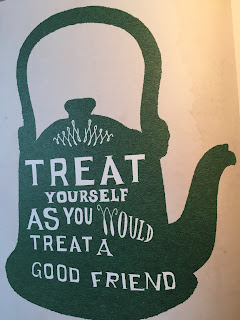 |
| Good Morning, Possum |
"Come here, come quick . . ." my husband said this morning when the day had barely begun. There it was just outside the door, this fat possum walking around our front deck, nosing the grass in the courtyard, inspecting the perimeter without a care. Fat and gray and furry. Now that I've looked up opossums, I'm thinking a Virginia Opossum because they're big and this one clearly out-ranked Mr. Wiggles, who weighs in at just under 10 lbs. The photos are a bit blurry but the video came out well. Deliberate, unhurried, curious. I had no idea the day would begin in such an interesting way. When we finally cranked a couple of windows it made way for a break in the decking and crawled under. One other year we had a den of foxes under there. That was less welcome.
So no doomscrolling for me this morning. The first thing I had to do was look up possums. Obvious to anyone who knows what I didn't: our guest is an opossum, not a possum. Possums don't live in North America. They are an entirely different animal. This visitor is a cat-sized omnivore with, like all opossums, a gentle nature. They don't attack pets and Mr. Wiggles for sure won't attack it. He'll bark, but he'll bark while backing away. He's not aggressive either.
Then the next good thing of the day. A friend forwarded this picture of a fawn she caught in her headlights as she neared the end of our driveway the other night. We've been seeing a few fawns lately but never, never have gotten a photo worth anything. The mom must be behind the cedar tree. They tend their fawns well.
Two special animal encounters plus I just finished Upstream by Mary Oliver ("Mary Oliver Speaks To Us Today," 3/28/20), a lovely book of essays that combines the natural world with the world of writing. I had planned to share it as soon as I read the first sentence: "One tree is like another tree, but not too much. One tulip is like the next tulip, but not altogether. More or less like people--a general outline, then the stunning individual strokes." "What a life is ours!" she says. "Doesn't anybody in the world anymore want to get up in the middle of the night and sing?"
Who can resist such exuberance? She's right of course. I know I have favorite trees. Double-trunked with nestled bowls for leaves and water.
Or curved to avoid a neighbor. Or tall with goiters for which I have no explanation. I have favorite boulders, big as tables and comfortable as chairs. And of course fine mossy places and beds of fresh gold pine straw, deep and spongy. (Who knew it wasn't brown?)
Oliver notices the way the ferns rise, delicately curled with a fuzz that presses against each frond.
"Attention is the beginning of devotion,"
she says. Well I can do that. I can pay attention to all that is outside my door. And I can do it during a pandemic as well as not. Maybe better. You too?
Nina Naomi








